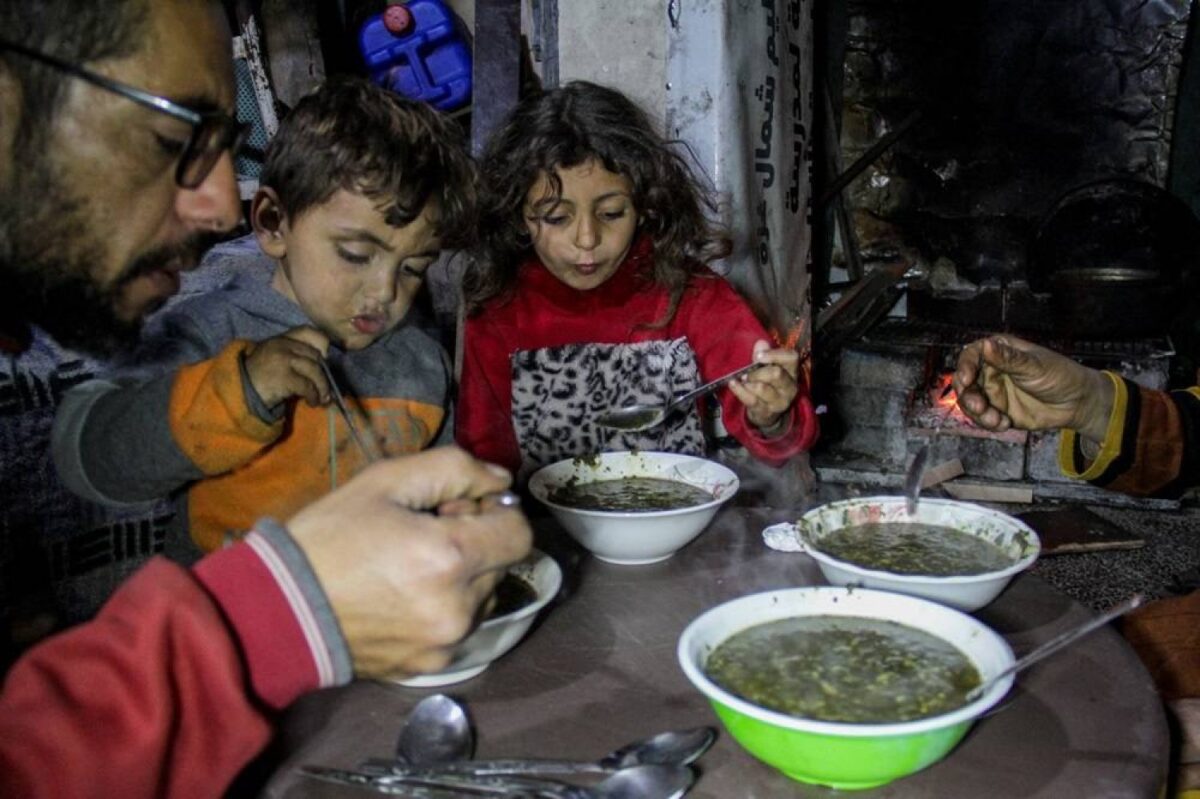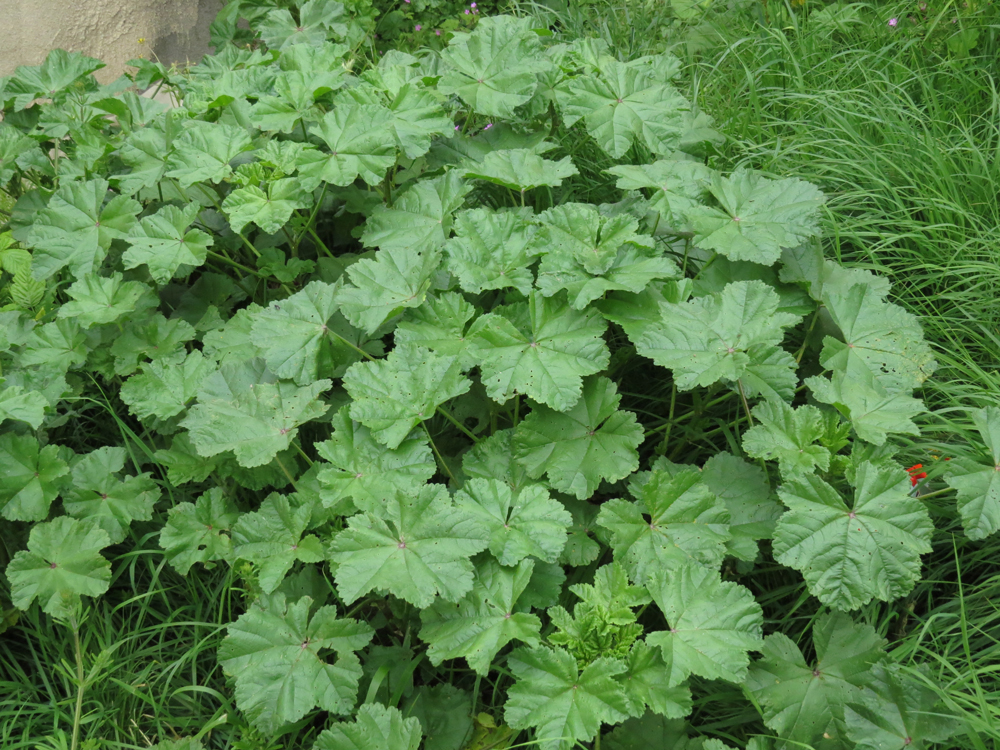Khobiza : Weed and Water Soup
I fool the children as it is only water and some greens. It is a soup without any real ingredients, saltless.*
In times of extreme food shortages, such as the current situation in northern Gaza, families resort to using any available resource to prepare a meal. One such makeshift dish is soup made from water and weeds gathered from the ground. It is the only “meal” available, which, although lacking any significant nutritional value, helps to stave off hunger and provides warmth throughout the day.
INGREDIENTS:
- Weeds (gathered from the ground)- Malva sylvestris
- Water
PREPARATION:
- Gathering the weeds: Collect weeds from the surrounding area. Try to select edible plants if possible. – Malva pusilla is very popular.
- Boiling: Bring water to a boil in a large pot. Add the gathered weeds to the boiling water.
- Cooking the soup: Let it cook for a few minutes until the soup takes on a slight flavor from the plants. The water may turn green, but it will not contain any substantial nutrients.
- Serving: Serve without any additional ingredients.
- As the UN Security Council demands an immediate ceasefire in Gaza and concerns grow that famine may take hold, the territory’s hungry civilians are foraging for a wild green plant called Khobiza for lack of anything else to eat.
“All our lives — even through (previous) wars — we have not eaten Khobiza,” said Palestinian woman Maryam Al-Attar.
“My daughters tell me, ‘We want to eat bread, mother.’ My heart breaks for them.”
“I can’t find a piece of bread for them. I go and gather some Khobiza. We have found Khobiza for now, but in the future, where will we get it from? Khobiza will run out. Where do we turn?”* 1
Malva sylvestris- This Wild Plant Is Keeping Gazans Alive:
” In northern Gaza, two pounds of rotten-looking potatoes sell for more than $10. Two pounds of rice sell for $20, up from $2 before the war, NPR reports. Many can’t afford to buy food, and some say they’ve had no access to humanitarian aid. “There’s no milk, no protein, no bread, no clean water, no fruits or vegetables,” says a mother of five, who at one point took to giving her children animal feed. She says every morning she fears waking to find one of her children has starved.
For some, there’s a lifeline in the form of a wild plant known as khobeza, khobiza, or “cheeseweed.” Comparable to spinach or kale, it “sprouts in knee-high thickets along roadsides and empty patches of dirt after the first winter rains,” reports the New York Times. Palestinians have long harvested khobeza, a variety of mallow, which can be boiled into an easy soup or sautéed in olive oil. It’s often seasoned with lemon juice or chile pepper. In wartime Gaza, chile pepper is a luxury. But khobeza alone is “making up an outsize portion of many Gazans’ diets by providing an inexpensive way to blunt hunger,” per the Times.
“Khobeza has supported us more than everyone else in the world,” a 35-year-old laborer in Gaza tells the outlet. “We are living on khobeza,” adds a 22-year-old in northern Gaza. “We make it into soup, we make it into stew, we make it into whatever we can.”
“People don’t grasp how empty and dire the situation is there, from the price of a bag of flour to a bag of onions,” says Palestinian writer Reem Kassis. “In the absence of anything else, [khobeza] is nutritious.”
Khobeza, or chalamit in Hebrew, also provided a lifeline for Israelis when Arab forces imposed a siege on Jerusalem in 1948, per the Times. But it’s only one plant, and harvesting it in Gaza is dangerous. The 22-year-old who spoke with the Times said a relative was shot and killed by a suspected Israeli sniper while foraging for the plant. But hunger is deadly, too.
In Gaza, more than 25 children have died from complications from malnutrition, per the Washington Post. “* 2
-By Arden Dier, Newser Staff – https://newser.com/story/348740/this-wild-plant-is-keeping-gazans-alive.html
Since October 2023, when the conflict between Israel and Hamas intensified, the humanitarian situation in Gaza has drastically worsened. The complete blockade imposed by Israel has effectively cut off essential supplies such as food, water, fuel, and medicine, leading to a dramatic deterioration in living conditions for millions of people. The region’s agricultural infrastructure, including farmland, orchards, and the fishing fleet, has been decimated—around 70% of the fishing industry is no longer operational, depriving residents of crucial food sources.
The blockade also restricts access to the sea, further limiting Gaza’s fishing capabilities. Israeli forces have targeted farms, greenhouses, and water infrastructure, resulting in the complete collapse of Gaza’s food system. Israel is using food as a tool in the conflict, deliberately restricting access to basic food supplies, forcing residents to forage for wild plants like khobiza to survive. Even these limited resources are at risk of running out.
The intent behind these actions is to weaken the civilian population through hunger and deprivation of basic necessities. As a result, 85% of Gaza’s population has been displaced, with many forced to move multiple times in search of safety and aid. International organizations, including the United Nations, are warning that this policy is leading to a risk of mass starvation. The blockade is not only creating severe food shortages but is also restricting humanitarian aid deliveries, exacerbating problems related to access to food and clean water. Most of Gaza’s residents are entirely dependent on external aid, which is being deliberately limited.


